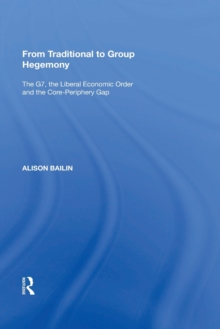Description
| Product ID: | 9781138356955 |
| Product Form: | Paperback / softback |
| Country of Manufacture: | GB |
| Title: | From Traditional to Group Hegemony |
| Subtitle: | The G7, the Liberal Economic Order and the Core-Periphery Gap |
| Authors: | Author: Alison Bailin |
| Page Count: | 194 |
| Subjects: | Politics and government, Politics & government, International relations, International relations |
| Description: | Select Guide Rating Developing a new theory of hegemony, called group hegemony, the author explains how a few wealthy countries maintain the liberal economic order and how this helps to sustain the economic disparity between the core and the periphery in the post-World War II era. The theory proposes that the G7 acts as a global government of last resort - a crisis manager - when other institutions prove inadequate to sustain the world order. Developing a new theory of hegemony, called group hegemony, the author explains how a few wealthy countries maintain the liberal economic order and how this helps to sustain the economic disparity between the core and the periphery in the post-World War II era. The theory proposes that the G7 acts as a global government of last resort - a crisis manager - when other institutions prove inadequate to sustain the world order. The G7 also supplies resources, such as large markets, foreign investment, and funding for international institutions. These goods serve to entice the majority of countries to participate in and abide by the rules governing the world economic order without changing the systemic distribution of power. The volume develops a theoretical analysis of the G7''s significance in international relations. It explains how the G7 countries collaborate to perpetuate the economic order and impart an institutional stability to an inequitable system. |
| Imprint Name: | Routledge |
| Publisher Name: | Taylor & Francis Ltd |
| Country of Publication: | GB |
| Publishing Date: | 2022-02-28 |


